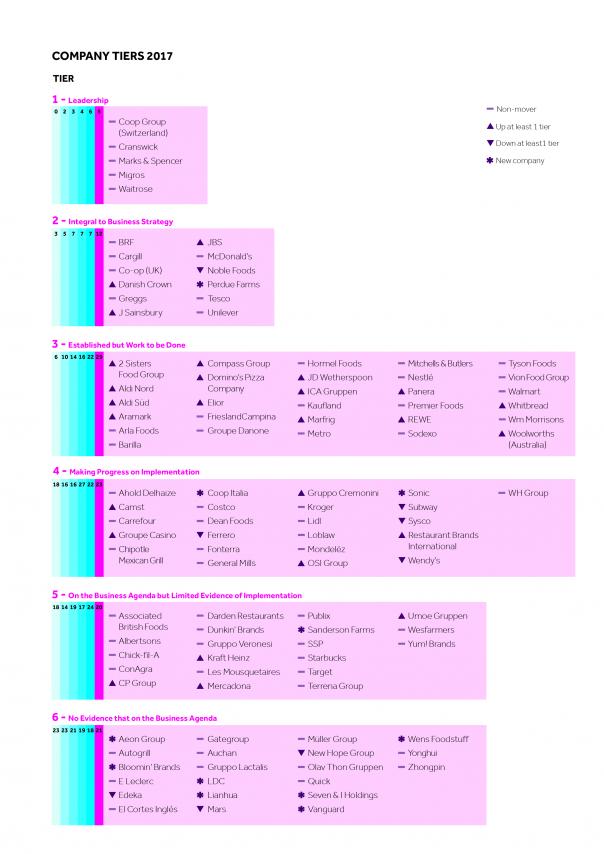
Having previously “significantly lagged behind” other sub-sectors – retailers continually dominating the top tier ranking – restaurants and bars have now successfully closed the gap, with the sector’s average score increasing from 27% in 2016 to 34% in 2017.
That said, the publisher agreed that “there is still much work to be done as the overall average score (37%) remains fairly low, and 41 out of 110 companies still appear in tiers five and six, indicating that they provide little or no information on their approach to farm animal welfare.”
Executive director of the Business Benchmark on Farm Animal Welfare, Nicky Amos, said: “The most significant change relative to the 2016 Benchmark is the dramatically improved performance of the restaurants and bars sector.
“Our discussions with companies in the sector suggest that this improvement is being driven by increased client and consumer interest in farm animal welfare, and by NGO, media and investor pressure on these companies to make public commitments on specific animal welfare issues (e.g. on cage-free eggs, on broiler chicken welfare, on reductions in the use of antibiotics).”
Of the 30 foodservice companies included in this year’s Benchmark from across Europe, the US, Asia and Australasia, 15 were non-movers, two new entries and two, Subway and Wendy’s, fell a tier.
Those most celebrated for showing “the greatest improvement" include Domino’s Pizza Group and JD Wetherspoon, who each moved up three tiers from tier six to tier three. A further 11 companies of the 26 that have risen by at least one tier this year, were also in the restaurant and bar sector.
While the report praised Domino’s for having “significantly improved its performance this year” and Wetherspoon for its “stellar performance in 201,” it said Subway’s “ongoing lack of clarity or detail in relation to policy commitments and implementation processes” decreased its performance and saw the company drop from tier three to tier four.
James Ullman, director of audit at J D Wetherspoon said: “J D Wetherspoon recognises that animal welfare is an important and integral part of sustaining our business.
“Ranking in tier six in 2016 presented a challenge and a great opportunity. Our progression to tier three in 2017 is an independent assessment of our commitment to these welfare standards. We welcome and respect the role of the Business Benchmark on Farm Animal Welfare and are delighted that the progress we have made in the last 12 months has been recognised.
“The challenge now for us, and our suppliers, is to continue this improvement to bring about a positive change.”
What’s more, only one UK foodservice company – Associated British Foods – ranks in the lowest two tiers compared to “several US-based foodservice companies,” including Starbucks and Yum! Brands – owner of KFC and Pizza Hut. The report said this “indicates that farm animal welfare is not yet acknowledged as a business issue or has yet to be formally implemented into many business processes.”
Chief executive of Compassion in World Farming, Philip Lymbery, commented: “I am encouraged by the growing number of companies embracing animal welfare and making it a priority in their business, and I’m particularly pleased by the steep change in attitude from within the restaurants and bars sector this year, which has traditionally lagged behind the retailer and manufacturing sectors.
“Pressure from consumers, investors, the media and NGOs, is shining a spotlight on farm animal welfare, forcing it up the corporate agenda. I congratulate those companies responding positively and encourage those yet to meet the challenge to start taking action for farm animals in their supply.”